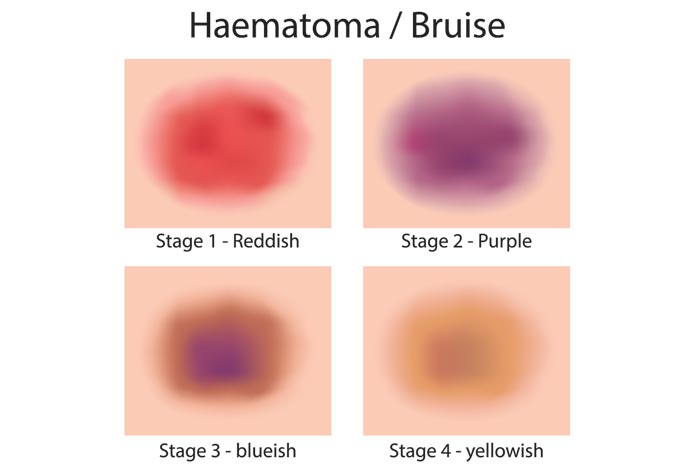
Bruises are very common and can be subtle (you don’t know it’s there until you touch the sore spot) or very visible.
Bruises are skin injuries that discolor the surface of your skin. It happens because blood from blood cells that are hurt by impact collects around your skin’s surface, making your soft skin a little (or a lot) black and blue.
What causes bruises?
Are you clumsy? Then you’re probably very familiar with bruises. They mostly happen when you hit or run into something, or vice versa. They can also form from the following:
- Vigorous exercise – Some bodybuilders and athletes will see bruises form without running into anything. They are caused by really tiny tears in blood vessels under the surface of your skin.
- For no apparent reason – If you find yourself with unexplained bruises regularly, you could have a bleeding disorder. You should be more alarmed if your unexplained bruises happen simultaneously with nosebleeds or bleeding gums, but also know that sometimes you don’t remember bumping the bed post.
- Elderly people are more likely to get bruises because you skin gets thinner as you get older.
- If you’re taking prescription blood-thinners, you’re also more likely to get bruises.
What are the symptoms of a bruise?
- Before you turn blue and black, your dark spot could be red at first. It takes a few hours for the bruise to darken to purple, blue or black. You’ll notice it lighten to yellow or green as it begins to heal.
- Bruises are usually tender to the touch, but the pain lessens as the bruise lightens and heals.
- No skin breaks if you only have a bruise, so there’s virtually no risk of it getting infected.
When are bruises serious?
- If you have a bruise that’s extremely swollen and extremely painful, you need to see a doctor, especially if you’re on prescription blood thinners.
- You are bruising frequently for no apparent reason.
- If you get a bruise under your toenail or fingernail (ouch!), call your doctor.
- If the bruise never lightens or doesn’t completely go away after several weeks, you might need to see a doctor.
- If you have a bruise around your eye, it can become a black eye because the blood falls below your eye due to gravity. If you are having trouble seeing or if the pain is unbearable, you might need to see a doctor.
- If you have a bruise on your head after an accident and you’ve got any signs of a head injury, you should seek medical attention immediately.
Do you have more questions about bruises? Stop by an Urgent Care clinic today if you have a bruise that needs attention.
